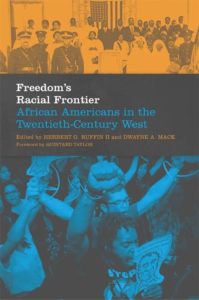Dwayne A. Mack, the Carter G. Woodson chair in African American History at Berea College, has collaborated on a newly published book Freedom’s Racial Frontier: African Americans in the Twentieth-Century West along with Herbert G. Ruffin II.
Between 1940 and 2010, the black population of the American West grew from 710,400 to 7 million. That growth has prompted a burgeoning interest in the history of the African American West—reflected in the remarkable range and depth of the works collected in Freedom’s Racial Frontier. Editors Ruffin and Mack have gathered established and emerging scholars in the field to create an anthology linking past, current and future generations of African American West scholarship.
The West as revealed in Freedom’s Racial Frontier is a place where black Americans have fought—and continue to fight—to make their idea of freedom live up to their expectations of equality; a place where freedom is still a frontier for most persons of African heritage. The book is published by the University of Oklahoma Press.
Ruffin is an associate professor of History and chair of African American Studies at Syracuse University, Syracuse, New York, and author of Uninvited Neighbors: African Americans in Silicon Valley, 1769–1990.
Mack is a professor of History at Berea College, author of numerous articles on African American history, and co-editor of Beginning a Career in Academia: A Guide for Graduate Students of Color.

